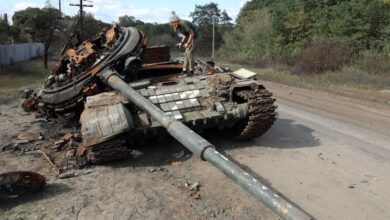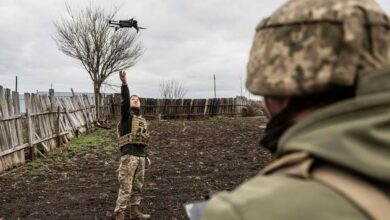US strikes Kataib Hezbollah militia across Iraq in retaliation for Taji rocket attack
Pentagon says US strikes targeted five Kataib Hezbollah weapon storage facilities, after a Wednesday rocket attack killed two Americans and one British soldier
U.S. airstrikes smashed into targets across Iraq after midnight on Friday, March 13 in an retaliation for a rocket attack on Camp Taji air base north of Baghdad earlier this week that killed two Americans and one British soldier.
“Earlier this evening, the United States conducted defensive precision strikes against Kataib Hezbollah (KH) facilities across Iraq,” the U.S. Defense Department said in a press release.
“These strikes targeted five weapon storage facilities to significantly degrade their ability to conduct future attacks” against forces deployed to the U.S.-led Coalition against Islamic State, adding that “facilities that housed weapons used to target U.S. and coalition troops” were among the targets.
“These strikes were defensive, proportional, and in direct response to the threat posed by Iranian-backed Shia militia groups (SMG) who continue to attack bases hosting OIR coalition forces.”
An unnamed U.S. official told AFP the strikes targeted “logistics nodes and UAV [drone] storage units.”
A second official told AFP that the strikes were a response a rocket attack on Camp Taji on Wednesday. “This is not a coalition operation. This a specifically U.S. operation,” the official said.
Defence Secretary Ben Wallace confirmed the United Kingdom did not carry out strikes.
“We support the right of the United States to defend themselves, as they have done tonight,” Wallace said. “We reiterate that those who seek to harm our armed forces can expect to receive a strong response.”
“The strikes began at 1 a.m. local time [2200 GMT Thursday] and are using various kinds of aircraft,” one of the sources told AFP.
U.S. officials said piloted aircraft carried out the strikes, Reuters reported.
Iraq’s military said that U.S. airstrikes hit facilities across the country.
“At exactly 1:15 a.m. today [Friday], an American air bombardment assault occurred in the areas of Jafr Nasr, al-Musayyib, Alexandria and Najaf, on headquarters belonging to the Hashd al-Shaabi, as well as emergency regiments and the 19th Brigade of the army,” the Security Media Cell tweeted.
An Iraqi security source told AFP that five heavy missiles hit the Jurf al-Sakhr area south of Baghdad, which is controlled by Kataib Hezbollah.
Husham al-Hashimi, a Baghdad-based expert on Iraq’s Iran-linked militias, reported strikes in Babil governorate, near Karbala, Qaim, Balad and Suwayrah.
Unverified photos purporting to show damage caused by U.S. strikes at a Karbala airport facility circulated on social media.
— Husham Alhashimi هشام الهاشمي (@hushamalhashimi) March 12, 2020
The images were geolocated to a site near the airstrip by the well-known open-source analyst who uses the handle Obretix.
جرف الصخر شمال بابل pic.twitter.com/31DVrNQXap
— Husham Alhashimi هشام الهاشمي (@hushamalhashimi) March 12, 2020
Pentagon warns of ‘consequences’ for attacks on US and coalition forces
Earlier Thursday U.S. Defense Secretary Mark Esper warned that “all options are on the table” to respond to the killing of three coalition personnel in the Katyusha rocket attack on Taji on Wednesday. Fourteen others were injured in the attack, including Americans, British, and Poles.
“The United States will not tolerate attacks against our people, our interests, or our allies,” the Pentagon release quoted Esper as saying. “As we have demonstrated in recent months, we will take any action necessary to protect our forces in Iraq and the region.”
“These terror groups must cease their attacks on U.S. and coalition forces or face consequences at a time and place of our choosing,” the Defense Department said, adding that force protection of Coalition personnel and preventing attacks on Coalition forces had been emphasized during discussions with senior Iraqi officials.
The Taji attack, which saw about 18 rockets land on the base, sparked fears of a fresh escalation of tensions between the United States and Iran.
While there has been no claim of responsibility, the Commander of U.S. Central Command on Thursday blamed Kataib Hezbollah, a Hashd al-Shaabi (Popular Mobilization Units) militia backed by Iran.
“The Iranian proxy group Kataib Hezbollah is the only group known to have previously conducted an indirect fire attack of this scale against U.S. and Coalition forces in Iraq,” General Kenneth McKenzie told a Senate committee.
The U.S. has blamed Kataib Hezbollah for repeated attacks targeting its bases in Iraq and the U.S. embassy in Baghdad in recent months.
In response to a December attack on the K1 base near Kirkuk that killed an American contractor and wounded Iraqi Security Forces and U.S. military personnel, the U.S. struck Kataib Hezbollah positions in Iraq and Syria. Then, President Donald Trump authorized a January 3 airstrike that killed Iranian Islamic Revolutionary Guards Corps Quds Force commander Qassam Soleimani and de facto PMU leader Abul Mahdi al-Muhandis, who was also the former head of Kataib Hezbollah.
Iraqi bases housing Coalition forces came under rocket fire late the following day, the 13th such attack in two months, prompting the U.S. military to halt training of the Iraqi Security Forces and joint operations against ISIS.
Soleimani’s killing raised fears that open conflict between Iran and the U.S. may break out in Iraq, and prompted the Iraqi government to temporarily close its airspace to military flights and call for foreign troops to leave the country, but the U.S.-led Coalition against ISIS resumed operations with the Iraqi Security Forces in late January.
With reporting from AFP. Fergus Kelly contributed to this report.












